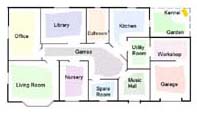
|
|||
|
|||

|
|||
|
|||
Hints and Things does not use any 1st Party cookies - more information .
Tips for Solving Hard Water and Limescale ProblemsWhat is Limescale? Limescale is the tough white crust you might find in your kettle or on taps, a residue left behind when hard water evaporates. Hard water contains more minerals than soft water. Soft water contains few impurities, usually because it runs through granite or slate but hard water runs through chalk or limestone, picking up the minerals such as calcium or magnesium carbonate.
Where is Hard Water Found?
How to Test for Hard Water? You can do a simple test to see if you may have hard water in your home by doing the following test with liquid dish washing soap: ? Find a clean empty plastic bottle with a cap and remove the cap; ? Fill the bottle about halfway with water (8-10 ounces); ? Add 10 drops of dish washing liquid; ? Put the cap back on and shake well; ? If the soapy solution foams up quickly you are okay and the water isn’t hard; ? If it does not foam up but instead creates a milk-curd-like or soapy film on the water surface then the water is likely hard. If you want a definitive answer then you
can send a water sample out for testing to a certified water-testing
laboratory.
1) Clean with malt vinegar or lemon juice. The acid will dissolve the limescale. However, this is really only practical for smaller items such as your dishes, silver, or tap fixtures and is only a temporary solution to the problem. 2) Some people create a cleaning paste for stubborn stains, consisting of 1/2 cup of baking soda with 1/4 cup of undiluted white vinegar. Leave the paste on for half an hour and scrub away with nylon bristles and wipe clean with a towel. Again, this is only a short-term solution. 3) For your washing machine or dishwasher, use a cup of vinegar or lemon juice in place of your regular detergent and run a full cycle. For a coffee maker or kettle, fill the kettle a quarter full with vinegar or lemon juice and leave for an hour. Then top up the kettle with water and boil it. Rinse the kettle or coffee machine thoroughly to avoid leaving the sour taste behind!
Copyright ? 2000-2020 Hints and Things cannot be held responsible for any information given on this site nor do they necessarily agree with, or endorse, the views given by third parties. |